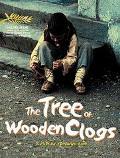
Italy 1978
Directed by
Ermanno Olmi
178 minutes
Rated G
Reviewed by
Bernard Hemingway

The Tree Of Wooden Clogs
Ermanno Olmi's recreation of life for three families of Lombardy tenant farmers during the course of a year in the late 1800's is a narratively simple but richly-detailed film which was shot in 16mm with non-professional actors from Bergamo, the region in which it is set. Announcing its agenda immediately by telling us that at that time the landlord was entitled by law to three-quarters of the tenants’ annual crop, the film is a very much in the spirit of Italian neo-realist film with its empathy for the common man and in particular his struggle to survive the inequities of capitalist society.
The outcome, if not actually sentimentalizing and patronizing (all peasants apparently being simple and superstitious), is an idealized portrait that visually often recalls mid-nineteenth European realist painting. The sense of verisimilitude is remarkable although arguably this is in part due the film’s adherence to that tradition. Whilst there are a couple of fleeting references to the political situation of the time, there is a small but crucial role for the Church, and the landlord, largely due to an incident which give the film its title, who is shown to be ruthless (one wants to question however, whether the culprit could not have been more cunning in his transgression), unlike Bertolucci’s 1900, for the most part Olmi’s concerns are confined to the interweaving of the various families' stories as they go about their daily activities over the course of a year.
One episode in particular, the planting of tomatoes by a grandfather and his grandchild, an activity that runs through the film illustrates the idealizing spirit of the film. Why one wants to ask does this apparently capable individual do nothing other than this and a few domestic chores? Given that the eventual yield of his crop amounts to one (attractively rustic) basket-full why does he sell them to a local restaurant owner rather than share them with his family? Surely it can have made no significant difference to the family’s finances? And as apparently (so we find out from the restaurant owner) he does this every year what is the big deal about their early arrival?
The film won the Prix D’Or at Cannes in the year of its release but as much as it impresses as a work in a visual medium, the performances are remarkable, and the humanistic spirit which informs the film is commendable in the absence of any vitalizing dramatic interaction, whether Olmi needed three hours to tell us his low-key tale is debatable.
Want something different?





